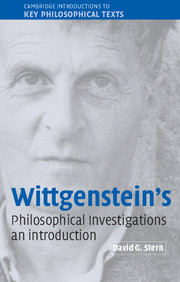Book contents
- Frontmatter
- Contents
- Acknowledgements
- Note on the text
- Introduction
- Chapter 1 Philosophical Investigations §§1–693: an elementary exposition
- Chapter 2 From the Tractatus to the Investigations: two prefaces
- Chapter 3 The opening of the Philosophical Investigations: the motto
- Chapter 4 The critique of referential theories of meaning and the paradox of ostension: §§1–64
- Chapter 5 The critique of rule-based theories of meaning and the paradox of explanation: §§65–133
- Chapter 6 The critique of rule-based theories of meaning and the paradoxes of rule-following: §§134–242
- Chapter 7 The critique of a private language and the paradox of private ostension: §§243–68
- Conclusion
- Recommended further reading
- References
- Index
Chapter 4 - The critique of referential theories of meaning and the paradox of ostension: §§1–64
Published online by Cambridge University Press: 05 June 2012
- Frontmatter
- Contents
- Acknowledgements
- Note on the text
- Introduction
- Chapter 1 Philosophical Investigations §§1–693: an elementary exposition
- Chapter 2 From the Tractatus to the Investigations: two prefaces
- Chapter 3 The opening of the Philosophical Investigations: the motto
- Chapter 4 The critique of referential theories of meaning and the paradox of ostension: §§1–64
- Chapter 5 The critique of rule-based theories of meaning and the paradox of explanation: §§65–133
- Chapter 6 The critique of rule-based theories of meaning and the paradoxes of rule-following: §§134–242
- Chapter 7 The critique of a private language and the paradox of private ostension: §§243–68
- Conclusion
- Recommended further reading
- References
- Index
Summary
AUGUSTINE ON LANGUAGE LEARNING: §1
Most interpreters take the opening remarks of the Philosophical Investigations as an outline of Wittgenstein's answers to questions about the nature of language. However, the opening of the Philosophical Investigations invites a multiplicity of readings, readings of the words Wittgenstein quotes at the beginning of the book, and of his opening words. As we shall see, Wittgenstein's opening is best understood as raising questions and introducing us to a number of voices in the discussion that follows.
ACCORDING TO MALCOLM, WITTGENSTEIN
revered the writings of St Augustine. He told me he decided to begin his Investigations with a quotation from the latter's Confessions, not because he could not find the conception expressed in that quotation stated as well by other philosophers, but because the conception must be important if so great a mind held it.
The oldest known source of the Philosophical Investigations' discussion of Augustine on language learning gives a similar explanation for the choice of Augustine. There, Wittgenstein parenthetically stresses the significance of the distance between our time and Augustine's:
(And what Augustine says is important for us because it is the conception of a naturally clear thinking man who, being far away from us in time, certainly doesn't belong to our particular intellectual milieu.)
- Type
- Chapter
- Information
- Wittgenstein's Philosophical InvestigationsAn Introduction, pp. 72 - 107Publisher: Cambridge University PressPrint publication year: 2004



